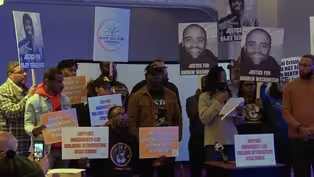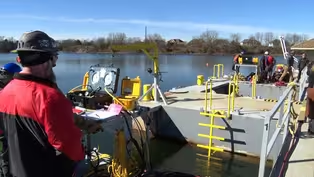NJ Spotlight News
Report: N. Korean workers abused in Chinese seafood industry
Clip: 3/1/2024 | 5m 44sVideo has Closed Captions
Interview: Ian Urbina, The Outlaw Ocean Project
Chinese companies that rely on -- and often abuse -- workers from North Korea are exporting seafood to the United States, where the products wind up on grocery shelves, on restaurant plates and in school cafeterias in New Jersey and around the nation. That's according to new reporting from The Outlaw Ocean Project.
Problems playing video? | Closed Captioning Feedback
Problems playing video? | Closed Captioning Feedback
NJ Spotlight News is a local public television program presented by THIRTEEN PBS
NJ Spotlight News
Report: N. Korean workers abused in Chinese seafood industry
Clip: 3/1/2024 | 5m 44sVideo has Closed Captions
Chinese companies that rely on -- and often abuse -- workers from North Korea are exporting seafood to the United States, where the products wind up on grocery shelves, on restaurant plates and in school cafeterias in New Jersey and around the nation. That's according to new reporting from The Outlaw Ocean Project.
Problems playing video? | Closed Captioning Feedback
How to Watch NJ Spotlight News
NJ Spotlight News is available to stream on pbs.org and the free PBS App, available on iPhone, Apple TV, Android TV, Android smartphones, Amazon Fire TV, Amazon Fire Tablet, Roku, Samsung Smart TV, and Vizio.
Providing Support for PBS.org
Learn Moreabout PBS online sponsorshipThey're abused and treated as subhuman.
If they try to escape, they'll be killed without a trace.
In a rare look inside the global seafood industry.
North Korean workers sent to Chinese factories are sharing what life is like as part of a forced labor operation that's long been used in China.
Companies that run the gamut.
Their stories are detailed by Pulitzer Prize winning reporter Ian Urbina, who runs the journalism nonprofit The Outlaw Ocean Project, investigating Crimes at Sea.
We first spoke with him in November about his work uncovering the human cost behind the seafood we eat.
And he joins me now to share his latest investigation.
Ian Urbina, thanks for coming back on the show.
Let me ask you first how these workers from North Korea end up in China in this labor program, this forced labor program?
Yeah.
So we're dealing with about 100,000 workers that are transferred in a relationship between the Chinese government and the North Korean government.
It's a heavily regulated transfer.
These are mostly women when it comes to the seafood industry that are being sent from North Korea to China.
They apply for these jobs.
They're pretty sought after jobs because they pay better than what they could ever earn in North Korea.
And they're transferred, you know, in this very regulated fashion and then held at the facilities and not allowed to leave.
The conditions, as you wrote them, seem to be dire.
How did they describe them to you?
Yeah, they're pretty dire.
So we're dealing with.
Normally before COVID, these women were stuck in these plants, which are sort of walled patrol compounds for two years.
And because of COVID, a lot of them got stuck for three and four years.
They're not allowed to leave the plant.
They're not allowed to listen to local TV or radio.
They're not allowed to interact with any of the locals.
When these women do leave the plant in a rare occasion, they always have a minder with them for outings.
A large portion of their pay is confiscated by the government.
And what was the most striking thing is that the women recounted 20 out of the 24 specifically recounted sexual violence.
Yeah, I mean, the stories are pretty gruesome.
How then, in were you and your team able to gain access to these workers?
Not easily, but sort of through layers of collaborators.
Folks in South Korea, North Korea, China and elsewhere, sort of a team of investigators that we organized.
And the most important of that chain of investigators were the folks in North Korea and in China.
Those investigators who are part of our team met with the women usually in parks or streets or open spaces where it was tougher for state security agents to surveil them.
These are quick interactions.
I provided them the investigators there with a list of 20, 30 questions.
They quickly asked the women these questions, transcribed their answers verbatim and then digitally transferred the written responses to us through encrypted apps.
When you and I first spoke in, we talked about your piece looking at as you titled it The Crimes behind the sea Food.
We eat that much of the seafood that's ending up on our plates here in the U.S. in New Jersey is being produced through either forced labor at a high human cost.
Is that the case here?
Are these products that are being imported to the US and to New Jersey specifically, were you able to trace it?
Yeah.
I mean, in this day and age, in a globalized economy, everything comes by these long supply chains.
Seafood is especially long and tangled and opaque.
We were able to connect the crimes to the consumers and including grocery stores and brands in New Jersey.
This means they're coming off of vessels.
They're going into processing plants in China, where these North Korean women are kept.
Then they're shipping them to the U.S. and those are shipping to either restaurants or grocery stores.
And in some case, food service companies like Sysco that service you military bases and the congressional cafeterias or the public institutions.
We're also getting seafood from the very same factories.
And so then how are these abuses, these labor violations, able to fall through the cracks?
There are many sanctions on using North Korean labor and those products making it here.
You spoke with our Congressman Chris Smith, about it.
Why is it that they're not working or not being enforced?
You know, I think there's a reckoning that's happening right now for the global seafood industry.
You know, textile and electronics had their moment of reckoning before, which is to say that these are industries with many companies, including U.S. companies that previously could sort of look the other way and be comfortable with what they didn't know about their own supply chain, especially in places like China.
I think seafood is now realizing they can no longer benefit from that willful ignorance and that they're going to have to know exactly what's happening in the factories that they're partnering with.
And that's hopefully what will happen next with this reporting.
Ian Urbina is a Pulitzer Prize winning journalist.
He's the director of the journalism nonprofit The Outlaw Ocean Project.
Ian, thank you so much.
Thanks for having me.
Activists: Community-based public safety making a difference
Video has Closed Captions
Clip: 3/1/2024 | 4m 13s | Groups gather a year after activist Najee Seabrooks was killed by Paterson police (4m 13s)
Congestion pricing: MTA gets earful at public hearing
Video has Closed Captions
Clip: 3/1/2024 | 4m 34s | Many speakers talk about the financial burden it would place on them (4m 34s)
Expanded health care for veterans exposed to toxins
Video has Closed Captions
Clip: 3/1/2024 | 4m 50s | Interview: Dr. Shereef Elnahal, US Department of Veterans Affairs (4m 50s)
Menendez co-defendant pleads guilty in bribery case
Video has Closed Captions
Clip: 3/1/2024 | 1m 10s | Jose Uribe agrees to cooperate with government investigators (1m 10s)
Offshore wind supporters pitch prospect of major jobs boost
Video has Closed Captions
Clip: 3/1/2024 | 3m 18s | The industry is South Jersey’s ‘biggest opportunity’ in decades, EDA official says (3m 18s)
Providing Support for PBS.org
Learn Moreabout PBS online sponsorship
- News and Public Affairs

Top journalists deliver compelling original analysis of the hour's headlines.

- News and Public Affairs

FRONTLINE is investigative journalism that questions, explains and changes our world.












Support for PBS provided by:
NJ Spotlight News is a local public television program presented by THIRTEEN PBS




